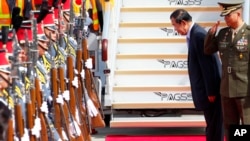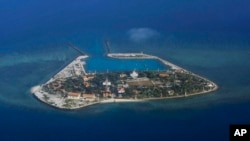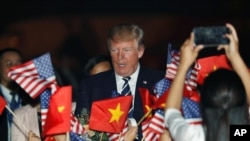As they prepare to meet to mark the 40th anniversary of their diplomatic relations, the US and the Association of South East Asian Nations (ASEAN) will focus on security issues in the region, particularly tensions in the South China Sea and the Korean Peninsula, according to a draft joint statement obtained by VOA Khmer.
The statement is set to be approved on November 13 at the 5th ASEAN-US Summit to Commemorate the 40th Anniversary of ASEAN-US Dialogue Relations. The meeting is part of the regional bloc’s annual summit, for which US President Donald Trump and the leaders of all 10 ASEAN nations are meeting in Manila starting on November 12.
The US and ASEAN “reaffirm the importance of maintaining and promoting peace, security, stability, safety and freedom of navigation in and over-flight above the South China Sea,” the statement says.
It urges a peaceful resolution to regional tensions over sovereignty in the South China Sea through international mechanisms such as the United Nations Convention on the Law of the Sea, and asks that a new Code of Conduct on the sea be finished as soon as possible.
ASEAN is a regional group that promotes economic, political and security cooperation among its 10 members: Brunei, Cambodia, Indonesia, Laos, Malaysia, Myanmar, the Philippines, Singapore, Thailand, and Vietnam.
Disputes over sovereignty in the South China Sea have emerged as one of the biggest security threats in the region over the past decade. As China has grown into a world power, it has made assertive claims to a large swath of the energy-rich sea, which has significant strategic and commercial importance. It is critical to the economies of ASEAN members Vietnam, Malaysia, Brunei, Indonesia and the Philippines.
U.S. allies Japan and South Korea use the sea's shipping lanes, over which about $5 trillion in trade passes annually. China has reinforced its claims to the sea with the construction of artificial islands, which the United States and others have criticized.
In recent years, ASEAN has been split between members like Vietnam and the Philippines, which want to hash out these disputes as a regional bloc, and those like Cambodia, which want every affected country to negotiate individually with China. This is also the position taken by Beijing, which has insisted it will only engage in bilateral talks over these arguments.
Cambodia notoriously emerged as a leader of this perceived pro-China bloc within ASEAN when it hosted the group’s annual summit in 2012 and blocked attempts to release a statement on the topic. Many interpreted the incident as a China-led effort to undercut regional unity and strengthen its own position. It was the first time in ASEAN’s history that its leaders could not agree on the wording of a joint statement.
At last year’s ASEAN summit in Laos, Cambodia also reportedly stymied efforts to release a statement on the issue, refusing to sign anything that mentioned the Philippines’ 2016 victory at the Permanent Court of Arbitration over its claims to part of the sea.
Foreign Minister Prak Sokhon told VOA Khmer in an interview in September that Cambodia’s main goal was to help find a peaceful resolution to the dispute while maintaining its own neutrality.
“We say yes to solidarity in ASEAN and no to taking side with any country that is involved in the dispute,” he said.
At the ASEAN summit in Manila, leaders are expected to discuss the long-awaited Code of Conduct for the sea, a framework for which was finalized earlier this year by Chinese and ASEAN leaders. The US has urged the nations to adopt a Code of Conduct that is binding and conforms to applicable international law. China, however, has condemned America’s statements on the matter as outside interference.
The US-ASEAN statement obtained by VOA Khmer said the nations welcomed “the conclusion and adoption of the framework of a Code of Conduct in the South China Sea (COC) and look forward to an early conclusion of the COC.”
It also urged adherence to an earlier agreement, the Declaration of Conduct, which was agreed to in 2002 as a temporary measure but has had little practical force.
Escalating tensions on the Korean peninsula are also a priority issue for this year’s meetings. The US-ASEAN statement condemns recent nuclear and ballistic missile launches from North Korea (also known as the DPRK).
The statement “urge[s] the DPRK and all parties concerned to exercise self-restraint and the resumption of meaningful dislodge through the relevant platform in order to de-escalate tensions and create conducive condo to peace and stability.”
Before Donald Trump’s scheduled visit to the Philippines, he traveled to Japan, South Korea, and China in what is his first trip to Asia as president. He also attended the Asia-Pacific Economic Cooperation meeting in Danang, Vietnam.
Shihoko Goto, a senior associate for Asia at the Woodrow Wilson Center in Washington, D.C., gave a generally positive review to Trump’s visit so far, highlighting his efforts to shore up America’s relationships with its regional allies in the face of North Korean aggression and Chinese expansion.
“So far, he has been able to reassure Japan and South Korea about the US alliance, and he has made clear US commitment to stand firm against Pyongyang, and not just because of the nuclear threat that it imposes,” she said.
On November 7, Trump gave a fiery speech to legislators in Seoul in which he affirmed the US commitment to defending South Korea against aggression from its northern neighbor, referring to the regime of North Korean leader Kim Jong Un as a “cruel dictatorship.”
Goto said Trump had successfully signaled America’s commitment to the region.
“The fact that he is not only going to APEC but also to the East Asia Summit meeting, has been reassuring insofar as it signifies US commitment to the region, especially when making an appearance means so much in the world of diplomacy,” she added.
However, Peter Maguire, a journalist, and professor who focuses on Cambodia, said that Trump had not yet convincingly demonstrated that the US had a coherent vision for its role in Asia.
“The abysmal failure of the Obama administration’s ‘Pivot to Asia,’ coupled with Trump’s unhinged rhetoric and decision to walk away from the TPP treaty has left America looking weak and confused in the region,” he said.
Maguire noted that Chinese initiatives such as the new Asia Infrastructure Investment Bank and the Belt and Road initiative had helped Beijing strengthen its political and economic grip over the region in recent years.
In the South China Sea, he said, China was already exercising de facto control over many technically disputed areas, rendering America’s and ASEAN’s insistence on the language of diplomacy and international law largely symbolic.
“With the exception of Vietnamese waters, China already has de facto control of the South China Sea and most of the ASEAN nations seem resigned to this,” he said. “America’s Freedom of Navigation operations are little more than a symbolic show of force.”












